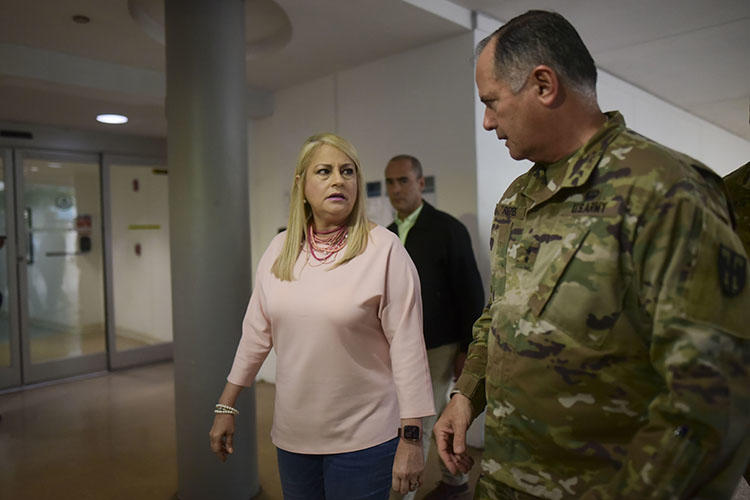In the three years since Hurricane Maria hit the island, Puerto Rico has experienced a financial, political, and public health crisis, but reporter Bárbara Figueroa Rosa told CPJ that these events “have no comparison” to the impact the coronavirus pandemic could have on the U.S. territory.
Journalists in Puerto Rico already mistrust the local and federal authorities, after the botched response to the devastating 2017 hurricane—in which thousands of people died—and new access to information and open data laws signed by ousted Governor Ricardo Rosselló in 2019 that severely limit access to public information.
Figueroa Rosa, who has worked at daily newspaper Primera Hora for 19 years, told CPJ, “We are not going to let our guard down, we are going to demand access; we have been blatantly lied to for years. What happened after Hurricane Maria is unacceptable.”
CPJ sent requests for comment via text message and email to Mariana Cobián, the spokeswoman for Puerto Rico Governor Wanda Vazquez Garced, but did not receive a response.
Puerto Rico’s Health Department said on March 31 that the island had 239 cases of the novel coronavirus and eight deaths due to the virus, according to the Miami Herald.
Primera Hora’s news team has reported on the virus outbreak since the first case was confirmed on the island, a 68-year-old Italian tourist from a cruise that was allowed to dock in Puerto Rico. A March 24 investigative report by Primera Hora looked into conditions at the Veterans Hospital in San Juan, where the majority of the coronavirus patients on the island were being treated.
This reporting has been conducted despite a lockdown on “nonessential” on-site operations and nighttime curfew, under an executive order signed by Governor Garced. Journalists are exempt from the movement restrictions.
CPJ interviewed Figueroa Rosa by phone on March 24, 2020. This interview has been edited for length and clarity.
How has the pandemic affected your daily work? Are you still covering your usual beat?
I am on the national news desk; therefore, my usual beats are politics, education, and court. They are still my focus, but now with a different perspective. The overall situation has intensified our work, even though we’ve agreed to work remotely as much as possible. We are working 10 to 12 hours a day. The virus’ information is continually changing, and we cannot disconnect ourselves.
The past few weeks were hard because the information from official sources was not flowing as it should but now is a little better. The lack of accessible factual data made us do countless calls that were not answered immediately and lengthened our workdays. Not being able to go out complicates things. Before, I would knock on the door of the agency or government official’s office or find out where he/she is and go after them to ask the precise questions.
What has been your greatest challenge in this environment? Why do you say the flow of information from the local government has improved?
Our greatest challenge is getting ahold of the sources. It is practically impossible, both from the private and government sector. Sometimes they pick up the phones; sometimes they don’t. But I must say that there’s also an emotional challenge. Our media company has given us some tools to safeguard our health. But as humans, we are all panicking. I cannot deny that I am afraid to cover a news story and return to my home to infect my family.
I can say that the flow of information from official sources has improved because two weeks ago, there was not enough testing, and we did not have accurate numbers. Now we have some data available through official websites. Again, we do not have any scientific projection of the possible impact from a state epidemiologist or real-time data.
Are you receiving emotional support from the news outlet?
Yes. Our editor has demonstrated solidarity and told us that if anyone is afraid to work, he was going to respect that decision. No employee is being forced to work.
What are you doing to keep yourself safe?
We are staying inside the most we can. If we go out, we wear N-95 masks, gloves, and follow the CDC [Centers for Disease Control and Prevention] security guidelines of social distancing. We also follow our employer’s security measures to receive confidential documents from sources.
Have you had any obstacles because of Rossello’s new laws?
Our team is aware of the laws, and every day we confront them. The documents or the data requested are delivered partly or not at all. For example, today I asked for copies of all the medical equipment purchased related to the handling of COVID-19, and, honestly, I know it will be a great fight to get it delivered if they ever send anything. Our most significant stumbling block is the lack of up-to-date information. We want the Puerto Rican Institute of Statistics to have more specific data. We want to see the data organized by people, by the patient so mayors and communities can make their containment plans. Our Health Department, which has been without direction for several weeks, keeps us on our toes as well.
How are you dealing with and responding to misinformation around the virus?
I am determined to confront it. I do not let my guard down and continue to fact-check everything a government official says, or I read on social media. With this mistrust that we have after the Hurricane María, we know how this government runs and keep pressuring, even if they recently passed laws against us. We are not going to let our guard down; we are going to demand; we have been blatantly lied to for years. What happened after Hurricane Maria is unacceptable.
